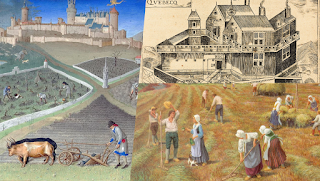Boralia offers a nicely provocative question in a recent post by Arnaud Montreuil: Was New France a society of the 'long middle ages"?
Montreuil seeks to bring to the historiography of New France an argument or observation from French history: that in the 1600s the still dominant ancien régime monarchies of Europe were rather successful in transplanting the long-established social structures inherited from the middle ages to their new colonies in the Americas. Latin America acquired feudal-ecclesial institutions: church and aristocratic authority, seigneurial forms of landholding, etc. broadly resembling traditional European structures, Montreuil declares, and so did New France:
To say that New France was a society of the long Middle Ages does not mean that it was backward, as a whole series of disparaging speeches, especially during the 19th century, have asserted. Rather, the idea is to highlight emphatically the fact that the dominant logic of Laurentian society was not capitalist, but feudal-ecclesial, in a manner similar to that which prevailed in medieval society.
Montreuil suggests mostly this is a concept not much taken up or debated by histories of New France. And he's is probably right. But the concept has been out there. I recall being struck by Robert Sweeny's declaration some years ago that
Canada [ie, New France on the St. Lawrence] was the world's last feudal society, whereas Newfoundland was the world's first capitalist society.
His point is that, where as New France was defined by traditional agriculture and landlord-tenant relations that supported aristocratic control and governance, the fishing stations that dominated the colonization of Newfoundland were largely devoid of both ecclesiastical and aristocratic influence and operated almost entirely as little factories, with labour relations not entirely unlike an Amazon warehouse today.
It would be interesting to include New France's Atlantic outposts, which like Newfoundland, broadly resembled the industrial model than the feudal one, into the analysis that Montreuil proposes. But New France studies usually mean studies of the St.Lawrence valley almost exclusively.
The argument also leaves out entirely why the British colonizations in North America and the Caribbean managed to create broadly capitalist, rather than "feodal-ecclesial," social and economic structures.
Image: from Borealia
